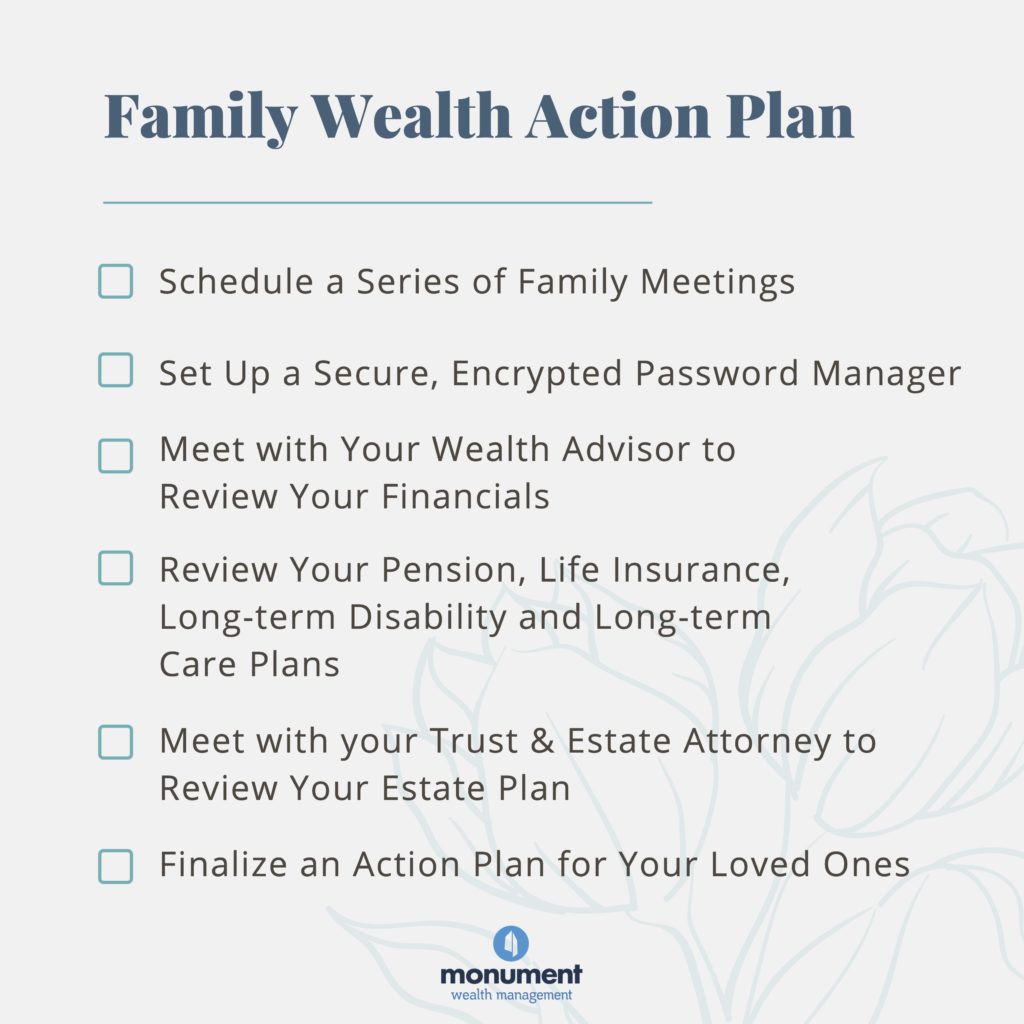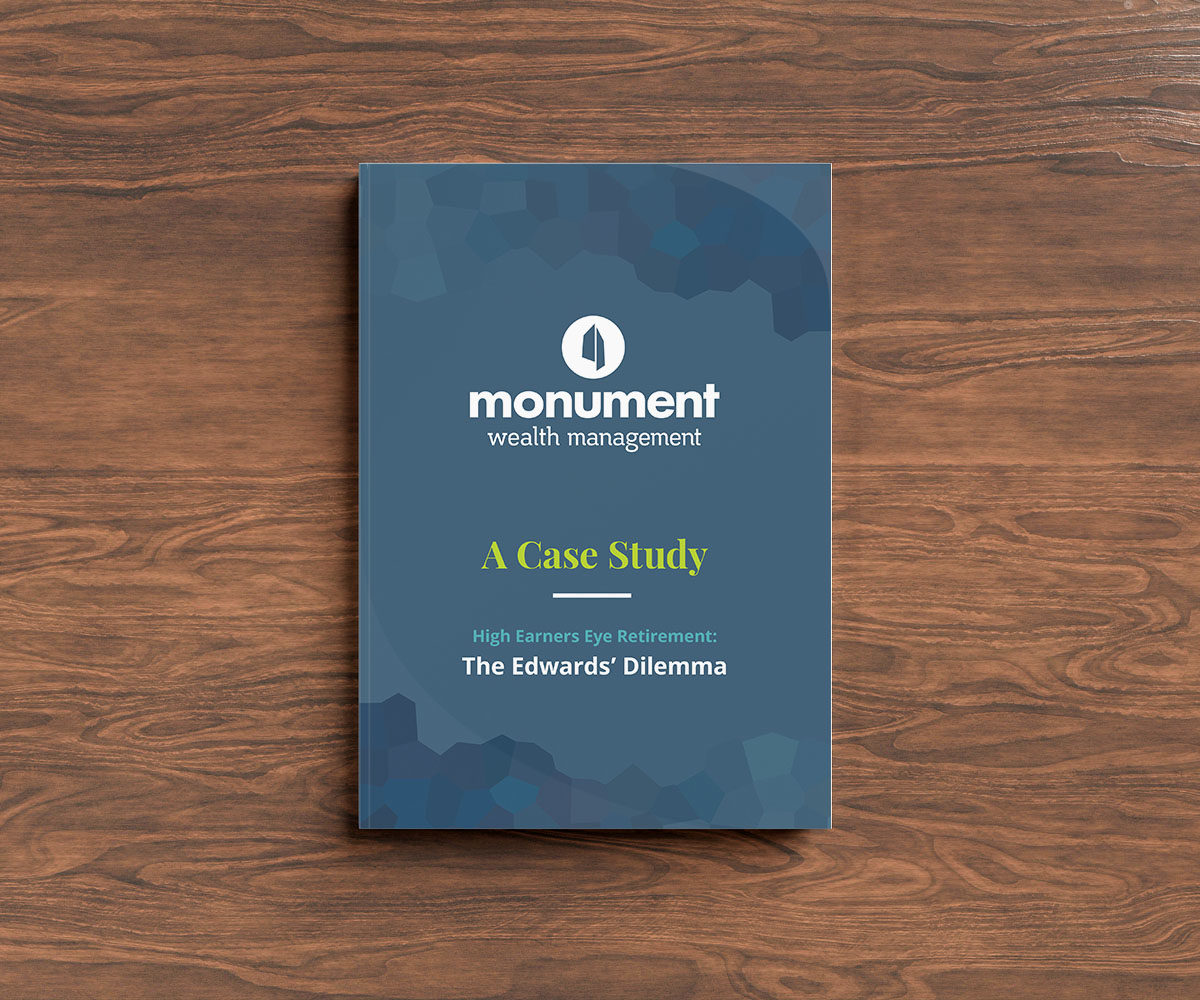Monument Wealth Management Articles
Preparing Your Loved Ones for When You’re Gone

Share on your favorite platform, or by email
Cancer. One word that no one wants to hear.
As we sat around the dinner table, I clenched my husband’s hand. The cheerful sounds of the bustling restaurant faded into the background as we tried to comprehend what his parents just shared with us: my father-in-law had been diagnosed with Stage 4 Melanoma. It was fall of 2018, and we immediately knew our lives were going to change forever, and we would face a difficult road ahead.
Whether it’s cancer or something else, you or a loved one have likely walked a similar road. After all, the National Cancer Institute reports that 39.5% of people are diagnosed with cancer at some point in their life.
While many courageously fight through illness and are blessed with long lives ahead, a time like this brings urgency to fulfill certain obligations and prioritize what matters most.
In my father-in-law’s case, and that of so many others, the urgency was all about family. Larry dedicated his life to supporting and caring for his family—what would happen if he were gone? Splitting up the household duties left “finances” in his hands—or to be honest, in his head. Larry took control of the situation the best anyone could, carefully preparing our family for whatever might come. Here are the steps we took and lessons we learned, along with advice from our Private Wealth Advisors here at Monument…
Hold Regular Family Meetings
Each family has a different communication style, and ours tends to be very transparent, honest and blunt. I think this benefitted us greatly, as having scheduled calls and visits to discuss important updates, expectations and requests allowed us all to understand the situation at hand and support each other accordingly. I definitely recommend holding regular meetings to keep everyone in the loop and to discuss each topic below.
Set Up a Secure, Encrypted Password Manager
As we all know, login usernames and passwords can really be a nightmare. What helped us immensely is saving all login information mentioned below to a quality, encrypted password manager. You can then provide access to a family member or keep a “master password” in your safe. That way, someone you trust can step in to help with these administrative matters if and when you need a hand. We cannot tell you how helpful this has been.
Review Your Financials
Your Private Wealth Design should be updated with all major life events, including a health scare. Now is an important time to meet with your Wealth Advisor to ensure your financials are in order.
- Assemble a list of all your financial accounts (bank accounts, investment accounts, etc.) and do the following:
- Ensure your beneficiaries are up to date for each account.
- Ensure there’s someone who can act on your behalf if needed – this goes hand in hand with reviewing your estate plan (more on that below).
- Make a list of any recurring money movements, bills to be paid, bills on autopay, etc., in case someone needs to take this job over for you while you’re focusing on your health.
- Once organized, hold a family meeting to discuss the current state of your financials. Designate a point person to step up if you need assistance and introduce your family to your Wealth Advisor to facilitate easy communication and reduce the anxiety of the unknown your loved ones may be feeling.
Review Your Pension, Life Insurance, Long-term Disability and Long-term Care Plans
Do you have a pension that gets passed on to your spouse? Are the named beneficiaries on any life insurance policies up-to-date and do those beneficiaries know how to file a claim?
- Refresh yourself and your family on the details of your policies and how to access the benefits they are entitled to.
- Depending on your diagnosis and treatment plan, you may be able to replace some of your income if you are unable to work for a period of time with benefits from a long-term disability policy. Sometimes these are provided as a benefit by your employer – if you don’t have a policy you’ve purchased on your own, talk to your benefits coordinator at work about your options.
- Don’t forget about long-term disability policies you may have purchased in the past, or long-term care riders that may be part of a life insurance policy you own. Every situation is unique – it’s best to discuss any policies you have with your Wealth Advisor to determine if there are any benefits to claim.
Review Your Estate Plan
There isn’t a hard and fast rule, but most attorneys recommend that an estate plan be reviewed whenever a big life event occurs—so now would be the time to do this.
- Meet with your Trust & Estate Attorney to make any updates to your estate plan and consider bringing your family along with you or making an introduction via email.
- Be sure to communicate with your family who you have designated to make important decisions on your behalf and carry out each part of your estate plan. For example, Jessica L. Gibbs, CFP® recommends that if you are of sound mind and judgement you designate a Power of Attorney for making financial decisions and a Power of Attorney for making healthcare decisions on your behalf (these can be the same person). She also recommends that you designate a contingent or successor Power of Attorney in case your primary person is unable or unwilling to serve in the role.
Create an Action Plan for Your Loved Ones
Taking all the information above into account, my father-in-law worked with us to create an “action plan” to put all these policies in place, make sure bills are paid and keep everything running if he were not able to do it himself. Nothing is more daunting than the unknown, and all the legal and financial matters can be very difficult to handle when you’re bogged down by grief.
Ask yourself: What would happen if I were gone tomorrow?
- Will my loved ones feel lost? In the dark? Confused? How can I help alleviate that feeling, and make the grieving process as easy as possible for them?
- If you own a business: What will happen to my company? Is my successor prepared to step up or do I have a buyer identified?
- Who will take over my “family duties”? Do they know how to do so?
- Will my family be financially taken care of?
- What will I leave behind as my legacy?
These questions are not meant to overwhelm, but just to get you thinking and to make sure you and your loved ones are prepared for anything.

Meet with your Private Wealth Advisor and Trust & Estate Attorney often to keep your legal documents and financial accounts up-to-date, and to make sure you have a solid action plan in place for your loved ones.
Although our family was left heartbroken after a long battle with cancer, I will say we are grateful and appreciative of all my father-in-law did to help prepare and take care of our family. But most of all, we are grateful for all the time we spent together, never losing site of what mattered most to us: family.

It’s time to find clarity around your finances and remove the anxiety of the unknown.
Read our case study, “High Earners Eye Retirement,” to see how we helped one of our clients plan for the long term.
Ready for straightforward, unfiltered opinion and tailored advice for YOUR questions, not everyone else’s?
Recent Awards & Press
By Monument Wealth Management Team
IMPORTANT DISCLOSURE INFORMATION
Please remember that past performance is no guarantee of future results. Different types of investments involve varying degrees of risk, and there can be no assurance that the future performance of any specific investment, investment strategy, or product (including the investments and/or investment strategies recommended or undertaken by Monument Capital Management, LLC [“Monument”]), or any non-investment related content, made reference to directly or indirectly in this blog will be profitable, equal any corresponding indicated historical performance level(s), be suitable for your portfolio or individual situation, or prove successful. Due to various factors, including changing market conditions and/or applicable laws, the content may no longer be reflective of current opinions or positions. Moreover, you should not assume that any discussion or information contained in this blog serves as the receipt of, or as a substitute for, personalized investment advice from Monument. To the extent that a reader has any questions regarding the applicability of any specific issue discussed above to his/her individual situation, he/she is encouraged to consult with the professional advisor of his/her choosing. No amount of prior experience or success should be construed that a certain level of results or satisfaction will be achieved if Monument is engaged, or continues to be engaged, to provide investment advisory services. Monument is neither a law firm nor a certified public accounting firm and no portion of the blog content should be construed as legal or accounting advice.
A copy of Monument’s current written disclosure Brochure discussing our advisory services and fees is available for review upon request or at www.monumentwealthmanagement.com/disclosures. Please Note: Monument does not make any representations or warranties as to the accuracy, timeliness, suitability, completeness, or relevance of any information prepared by any unaffiliated third party, whether linked to Monument’s website or blog or incorporated herein, and takes no responsibility for any such content. All such information is provided solely for convenience purposes only and all users thereof should be guided accordingly.
Historical performance results for investment indices, benchmarks, and/or categories have been provided for general informational/comparison purposes only, and generally do not reflect the deduction of transaction and/or custodial charges, the deduction of an investment management fee, nor the impact of taxes, the incurrence of which would have the effect of decreasing historical performance results. It should not be assumed that your Monument account holdings correspond directly to any comparative indices or categories. Please Also Note: (1) performance results do not reflect the impact of taxes; (2) comparative benchmarks/indices may be more or less volatile than your Monument accounts; and, (3) a description of each comparative benchmark/index is available upon request.
Please Remember: If you are a Monument client, please contact Monument, in writing, if there are any changes in your personal/financial situation or investment objectives for the purpose of reviewing/evaluating/revising our previous recommendations and/or services, or if you would like to impose, add, or to modify any reasonable restrictions to our investment advisory services. Unless, and until, you notify us, in writing, to the contrary, we shall continue to provide services as we do currently. Please Also Remember to advise us if you have not been receiving account statements (at least quarterly) from the account custodian.